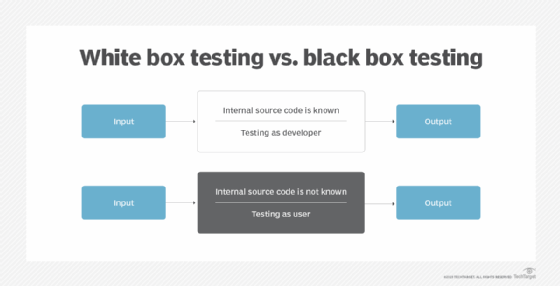What is functional testing and how does it work?
Functional testing is a type of software testing intended to ensure that the software behaves as expected and its output meets end user or business expectations. During functional testing, each function (or feature) of the software is compared with its requirements and specifications to verify that there's a match between "what is" and "what should be".
Software developers use functional testing to perform quality assurance (QA). If a system passes functional testing, it can be verified for release to clients or end users. Functional testing is important as it confirms that the application meets customer requirements since the process tries to closely reflect the true experience of a user.
Purpose of functional testing
Functional testing determines whether the application produces the expected output. Each function is tested for alignment to documented requirements, specifications, and business rules. For the application to have value or perceived quality, it must meet user expectations and enhance user experiences.
Functional testing is a vital part of the testing process and the software development lifecycle (SDLC). If an application does not pass the functional test, it is usually not deployed to end users.
To validate that the system works as intended, some or all of these aspects may be tested during functional testing:
- Inputs and outputs (entry and exit points).
- User-accessible features.
- User interfaces (UIs) and flows (navigation).
- Database.
- System-user interactions.
- User roles and permissions.
- Database and data manipulation.
- Application program interfaces (APIs).
- Security features.
- Client/server interactions.
- System integrations.
- Error handling process.
Read about the important stages of the SDLC, including testing here.
Benefits of functional testing
The main benefit of functional testing is that it ensures, as best as possible, that the application will satisfy the end user. The tests confirm user workflows and interactions to ensure the product meets their needs.
Functional testing evaluates how the product responds to different scenarios and conditions. It also checks how different components interact and validates the application's various features and capabilities. The tests prove that the product works as expected and outcomes are as anticipated and grounded in documented functional specifications and requirements.
This type of testing also verifies the system's response to various scenarios and conditions. This ensures that when those scenarios occur in real life, the product will not break or impair user experiences (UX).
Besides verifying that all requirements are met, functional testing helps identify functional issues early in the SDLC. Developers can then fix issues before they escalate and increase the project cost. Functional testing documents that all identified defects are removed. This enhances overall application quality, usability, reliability, and stability.
Through functional testing, dev teams can confirm that the application is compatible across different platforms and works across them seamlessly and without error. Finally, testing versifies that the product's security posture is as strong as possible and the software complies with all relevant standards and regulations.
Example of functional testing
Consider an e-commerce site.
Here's what the end-to-end purchase process on the site will look like:
- User creates an account by providing an email address and chooses a password.
- User logs into the site.
- User browses the site's pages and navigates to a particular section to find their product.
OR
- User enters a search term into the site's search box.
- User selects a product and adds it to their cart.
- The site automatically applies applicable discounts, free shipping, etc. to the purchased product.
- User checks the final price and proceeds to payment.
- Post successful purchase, user gets an on-screen notification.
Before the site is live, functional testing would occur to confirm that this process works properly and consistently. Testers would test all of the requirements:
- The site allows users to log in with valid credentials.
- The login feature correctly handles invalid credentials, for example, by displaying an on-screen error message and preventing access.
- Users can reset their passwords to regain access.
- The site returns relevant results in response to user search.
- Users can add items to their shopping cart.
- The site correctly calculates and displays the product's final price.
- The payment gateway accepts a valid payment method and rejects invalid methods.
- The site processes the user's payment and displays an on-screen notification and/or sends an email to the user's registered email address to confirm the purchase.
Errors in any of these functions could affect the site's overall functionality, availability, or performance adversely and damage user experiences. Functional testing ensures that these errors don't occur and everything works correctly..
How does functional testing work? Functional testing process
To perform useful functional tests, testers first identify the test inputs (the functionalities to be tested). They also create functional test cases. A test case is a document that provides clear instructions to test a specific function and verify that it behaves in accordance with specifications.
To test individual functions or features, the software is fed input and test cases are executed using the identified inputs. Actual output is compared to expected output. If the two match, the system functions as expected. If not, the dresults are incorrect and the application needs changes.
The steps typically involved in functional testing are:
- Identifying the functions the software is expected to perform.
- Creating input data based on each function's specs (determining which core features are to be tested).
- Determining the desired output based on the functional specs.
- Executing the test case using the identified inputs to see how the system behaves.
- Comparing actual output to anticipated output.
- Recording the defect/error.
After these steps are completed, the development team resolves the documented errors.
The testing team then re-executes the test cases to confirm that the defect has been addressed. They then mark the defect as closed.
Types of functional testing
Functional testing techniques include:
- Unit testing. The individual components or modules of the source codebase, such as functions, methods, or classes are tested in isolation to determine whether they match the requirements. The goal is to ensure that these components work correctly under different input conditions. Unit testing is the fastest, least expensive type of software testing and can help improve code quality, reliability, and maintainability.
- Smoke testing. A series of test cases serve to verify that an application's main features and core functionalities work properly individually before combining them. Smoke testing enables testing teams to determine if the build is flawed and whether it contains any showstopper issues. With smoke testing, major issues may be discovered early, giving dev and QA teams time to implement fixes and if needed, initiate more rigorous tests.
- Sanity testing. This occurs after a smoke test to verify that all vital features work correctly together, both individually and as part of the system. It is a subset of regression testing and has a narrow and deep focus. Teams can initiate more extensive tests after a sanity test to further improve software quality.
- Regression testing. This testing ensures that any changes made to the codebase -- such as to add a new feature or functionality, to fix a bug, etc. -- do not break existing functionality. Regression testing ensures that the software remains stable after updates, performance improvements, and bug fixes.
- Black box testing. The functionality of the software under test is studied without looking at its internal workings, code structure, or implementation details. With black box testing, the tester also has no knowledge of internal paths. They focus only on the product's external behavior. This type of functional test can help to uncover issues from a user's perspective and enhance user experiences.
- White box testing: The white box test explores the system's code structure, application paths, and internal paths. The goal is to optimize code so it meets quality standards and validate the system's internal functions to ensure they do what they are supposed to do.

- Gray box testing. This testing combines aspects of black box and white box testing. The tester has partial knowledge about its internal workings. This allows them to design more targeted test cases to increase test coverage and validate the system's external behavior, particularly around high-risk areas.
- Integration testing. Integration tests determine whether various sub-systems or components are properly compatible to carry out basic functionality. The tests check that the system's individual modules work well together to produce the expected output. APIs should be tested, too.
- User acceptance testing. UAT is performed by actual users to ensure that the software can handle required tasks in real-world scenarios, according to specifications. Testers perform UAT before go-live to confirm that it is user-friendly, meets user needs, and is ready for deployment.
Functional testing vs. non-functional testing
Functional testing focuses on testing an application's ability to execute a task. The aim is mainly to ensure that its functions behave as expected and its operational aspects match stated functional requirements.
In contrast, non-functional testing looks at the application's non-functional aspects, such as its overall performance, scalability, reliability, security and compatibility. Instead of checking if the software meets specific requirements, testers assess its performance under various conditions.
Functional testing is not concerned with how the processing occurs but rather the results of processing. Although functional testing simulates actual system use, it does not make any system structure assumptions.
Testers can use various techniques for both functional and non-functional testing.
Popular functional testing techniques include:
- Decision-based tests. The tester checks for possible outcomes when a particular condition is met using if-then or if-then-else logic.
- End-user-based tests. Testers test if all components of the system are working together correctly and not causing any errors.
- Equivalence tests. Testers create equivalence data cases to verify that two versions of the system behave equivalently under the same conditions.
- Boundary value tests. These tests assess how the system behaves when data boundaries -- minimum, maximum, just above, just below -- are implemented.
- Ad-hoc tests. With these tests, testers test the system without predefined test cases to uncover defects that might have been missed previously.
Popular techniques for non-functional testing include performance testing, load testing, usability testing, and stress testing.
Functional testing tools
Many tools support functional testing. These include:
- Selenium. This open source Selenium functional testing framework is used for automating web applications for testing and web-based administration tasks. The tests can be created in many different programming languages and executed on multiple browsers or platforms.
- HPE Unified Functional Testing software. Developed by HP, this tool automates functional testing across multiple application layers for many major application environments and development technologies. Besides multi-layer testing, it also addresses GUI testing, headless layer testing, and non-GUI testing.
- TestingWhiz. This is a codeless test automation tool for testing multiple scenarios like web, database, regression, and mobile testing within the same test case. It includes numerous useful features, such as a Selenium Java editor, a job scheduler, and test case recording and playback to simplify functional testing. It integrates with many tools, frameworks, and platforms to ensure seamless test case execution across multiple browsers, environments, and conditions..
- JUnit. This is a framework for testing Java applications, although it also help test applications in many other languages. It supports multiple test cases and can print out test results.
- Watir (Web Application Testing in Ruby). This is an open source functional testing tool comprised of Ruby scripting language libraries.
Modern functional testing tools streamline the process of verifying software functionality through automation. Many of these tools are easy to use and scalable to handle high-volume test runs. Useful tools allow testers to write test cases in multiple programming languages and execute the cases across multiple platforms and browsers. The best tools integrate with CI/CD pipelines so teams can run any number of automated tests as needed and during every build cycle. These tools also let users reuse test cases so they can save time and effort. Finally, intelligent tools simplify test case maintenance so dev and testing teams can easily modify or update the cases as the application evolves.
CI/CD can transform an organization, but there's a lot to consider. This comprehensive guide explains the CI/CD pipeline stages, benefits and challenges, best practices and more.
CI/CD can change how an organization operates, but several factors must be considered. This guide explains the stages of the CI/CD pipeline, its benefits and challenges, best practices, and more.






